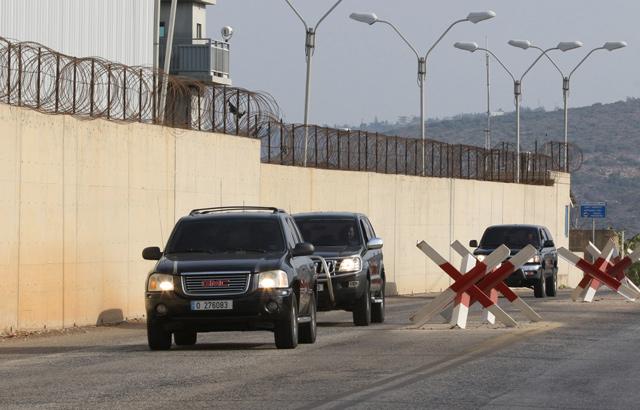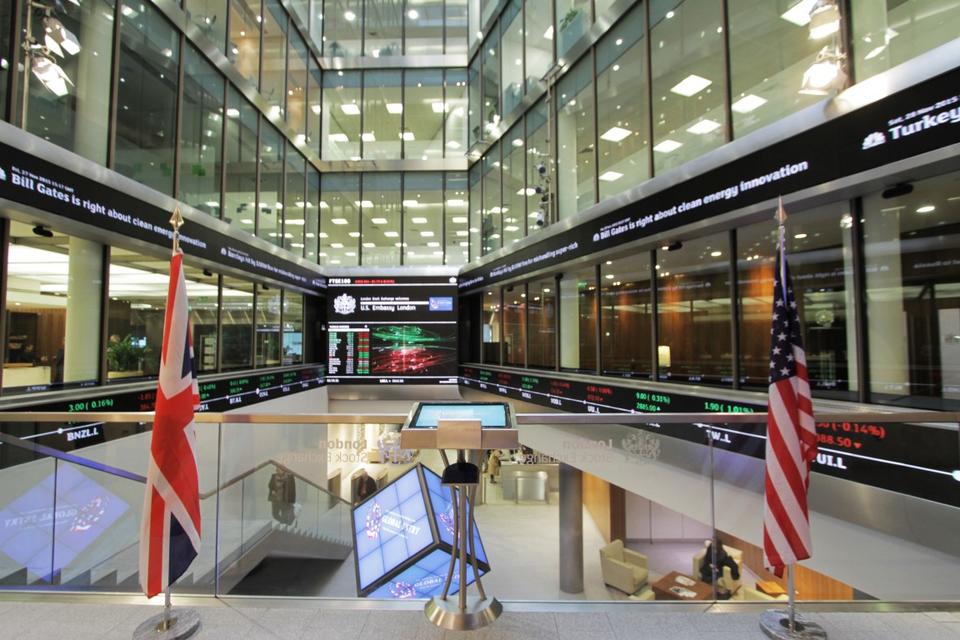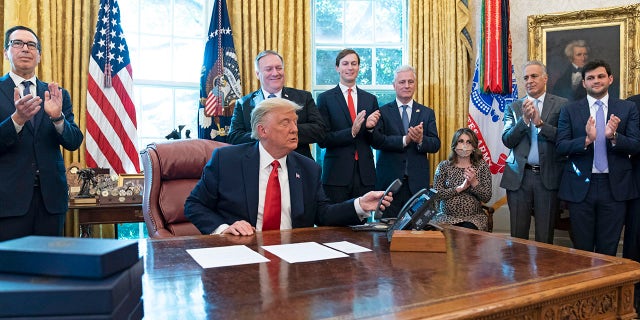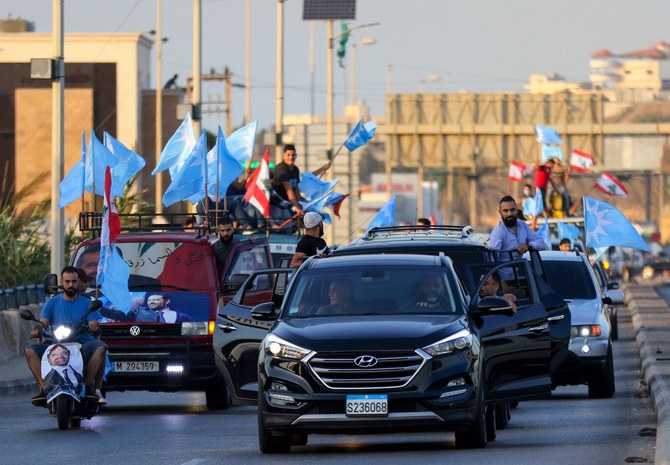by newsmax — Iranian hackers accessed voter registration data in one state and attempted to access more in a series of targeted attacks dating back to September, according to a U.S. government cybersecurity advisory. The FBI and the Cybersecurity Infrastructure Security Agency — a unit of the Department of Homeland Security — revealed Friday that […]

by ncregister.com — Doreen Abi Raad — BEIRUT — ’The horrific double explosion on Aug. 4 in Beirut, Lebanon, destroyed half of the Middle Eastern country’s capital, especially regions inhabited by Christians. The disaster — considered one of the world’s most powerful non-nuclear explosions — is the result of the detonation of 2,750 metric tons of ammonium nitrate stored for years in a port warehouse. It killed 200 people, injured more than 6,500 and left 300,000 people homeless. The tragedy comes as Lebanon’s economy is collapsing, pushing the population further into poverty. Maronite Catholic Archbishop Paul Abdel Sater of Beirut spoke to the Register at the chancery, where destruction from the explosion, like so much of Beirut, is obvious. Breezes blow from blasted-out windows of the chancery’s lobby. Makeshift glass sheets cover the damaged windows in the archbishop’s office, his desk chipped and splintered from the impact of glass shards. Archbishop Abdel Sater spoke of his anguish in seeing the Lebanese people suffer, the absence of the government in assuming its role in reconstruction, the expression of solidarity and care on the part of Pope Francis through the visit of the Vatican secretary of state, Cardinal Pietro Parolin, and the rise in emigration of Lebanon’s Christians. He urged the international community to support Lebanon so that it may continue — as Pope St. John Paul II had proclaimed of Lebanon — as a “message.”
What was the greatest pain for you as a shepherd, related to the blast?
The greatest pain was a few minutes following the explosion when an employee and a priest were injured here at the chancery. We took them to the hospital. Seeing all these people — fathers, mothers, husbands, wives — who were all bleeding, walking aimlessly in their house clothes looking for a hospital to receive them. It was sad to see how much the Lebanese people have been robbed of their dignity. And the only thing I was thinking about was that this person I see now, bleeding, is a father who is important in the life of his family. Or a mother who sacrificed so much for her family. And they have been treated this way by an unknown evil person or persons (who perpetuated the explosion). For what?’ What makes me sad is that Lebanon is a country where the human person is losing his and her dignity and it’s a country that has sacrificed many of its children.
by Catholic Herald — Christopher Altieri — — Pope Francis has sent a telegram expressing his condolences to families of victims and reiterating his spiritual closeness to the Catholic community and the entire French people, in the wake of a brutal knife attack in Nice’s Notre Dame church that left three people dead on Thursday […]

By AFP — NAQURA, Lebanon — Lebanon and Israel, still technically at war and with no diplomatic ties, launched a second round of maritime border talks on Wednesday under UN and US auspices to allow for offshore energy exploration. The talks, expected to last for two days, were being held at a base of the UN peacekeeping force UNIFIL in the Lebanese border town of Naqura, guarded by army roadblocks and with UN helicopters circling above. After years of quiet US shuttle diplomacy, Lebanon and Israel this month said they had agreed to begin the negotiations in what Washington hailed as a “historic” agreement. The announcement came weeks after Bahrain and the United Arab Emirates became the first Arab nations to establish relations with Israel since Egypt in 1979 and Jordan in 1994. Lebanon — which last saw military clashes with Israel in 2006 — insists that the negotiations are purely technical and don’t involve any soft political normalisation with Israel. “Today’s session is the first technical session,” said Laury Haytayan, a Lebanese energy expert who said she expected “detailed discussions on demarcation”.
Talks later wrapped up and were set to resume at 10 am (08:00 GMT) Thursday, the state-run National News Agency reported. A Lebanese source familiar with negotiations said that the first round of technical talks were “positive”. ‘Maximalist approach’ Lebanon, mired in its worst economic crisis since the 1975-1990 civil war, is looking to settle the maritime border dispute so it can press on with its offshore quest for oil and gas. The search for hydrocarbons has already heightened tensions in the eastern Mediterranean, following repeated Turkish exploration and drilling operations in waters claimed by both Cyprus and Greece. In February 2018, Lebanon signed its first contract for drilling in two blocks in the Mediterranean with a consortium comprising energy giants Total, ENI and Novatek. Exploration of one of the blocks is more controversial, as part of it is located in an 860 square-kilometre area claimed by both Israel and Lebanon. Lebanon is expected to adopt a “maximalist approach”, said Haytayan.

By Tony Akleh — arabianbusiness.com — The ongoing economic crisis in Lebanon has placed additional pressure on the banking system, prompting lenders to delist global depositary shares (GDS) from international stock exchanges. The move has been taken to minimise unnecessary costs outside Lebanon in order to meet the challenge of raising their capital by February 2021. If they can’t raise capital by 20 percent, they risk having to exit the market, according to a directive sent out by Riad Salameh, governor of Lebanon’s central bank. BLOM Bank has applied for the withdrawal of its GDSs from trading on the EUROMTF and the Official List of Luxembourg Stock Exchange, as well as for the withdrawal from trading on the London Stock Exchange, with a proposed implementation of November 24.
BLOM Bank has applied for the withdrawal of its GDSs from trading on the EUROMTF and the Official List of Luxembourg Stock Exchange Prior to this decision, the traded GDSs witnessed low volumes and limited liquidity this year, making administrative costs outweigh the benefits. The GDSs and its underlying shares will continue to trade on the Beirut Stock Exchange. Bank Audi has also announced that it has applied for the cancellation of the listing of its global depository receipt (GDR) from the London Stock Exchange with effect from November 16 although they will continue to be listed and traded on the Beirut Stock Exchange.
The daughter of Lebanese President Michel Aoun Raoukouz and chairman of the National Committee for Women in Lebanon, Claudine Aoun, said in an interview with the local television network Al-Jadid that she supports peace with Israel. During the interview, Aoun said: “We have our problems. The question of marking the borders, our natural resources and […]

By By Kate Scanlon — Washington, D.C. Newsroom, (CNA).– As Lebanon continues to deal with fallout from the massive August explosion that devastated parts of the capital, Beirut, advocates for Lebanese Christians call for continued U.S. aid and collaboration with local NGOs, while one State Department official says that conversations about additional aid have stalled. On Oct. 19, the Daily Star, an English-language newspaper in Beirut, reported that US Secretary of State Mike Pompeo told Lebanese President Michel Aoun by phone that the United States would send additional aid to rebuild areas damaged by the port explosion in Beirut earlier this year. An official State Department read-out of the call between the leaders did not mention such a pledge, and a spokesperson for the State Department did not return a request for comment on whether Pompeo had pledged additional aid to the president, but an official within the State Department said conversations about a second round of aid have stalled within the government.
Lebanese authorities attributed the Aug. 4 blast in the port of the country’s capital and largest city to “highly explosive material stored unsafely.” The explosion left 190 dead, more than 6,500 injured, and three people missing, as well as approximately $15 billion in direct damage. In the aftermath of the explosion, the United States pledged more than $17 million in initial aid for Lebanon for food assistance and medical supplies. Some advocates called for additional relief funds in response to the disaster, pointing to approximately 300,000 people officials said have been displaced from their homes. Al Jazeera reported 70,000 homes were among the buildings damaged in the explosion. Advocates for Lebanese Christians told CNA that funds dedicated specifically to reconstruction were vital, because much of the damage occurred in neighborhoods with a Christian majority. If these Christians are unable to return to their homes, it could shift the demographics of the city—and the country—by destabilizing the Christian community there.
They also stressed that working with established partners in NGOs would safeguard funds from Lebanon’s corrupt government. A State Department spokesperson told CNA that the U.S. government provided more than $750 million to Lebanon last year, and that the United States has provided more than $41.6 million in supplemental foreign assistance and redirected $11.5 million in USAID Mission funding to help Lebanon respond to the COVID-19 crisis. According to data from the Department of State, the United States has provided more than $4 billion total in foreign assistance to Lebanon since 2010. “American assistance to Lebanon saves lives, strengthens our strategic partners, ensures key services reach the Lebanese people and refugees, and counters Hezbollah’s narrative and influence,” the spokesperson said in an email. The spokesperson added that the U.S. government “directly supported the Lebanese people in the aftermath of the port explosion,” by providing “immediate humanitarian assistance to meet emergency needs,” including emergency food, shelter, and medical assistance. “We continue to work with our partners in Beirut to identify additional recovery needs,” the spokesperson said.

By Morgan Phillips | Fox News — President Trump on Friday announced a peace deal that would normalize ties with between Israel and Sudan, claiming there “would be many more peace deals to come in the Middle East.” Trump invited reporters into the Oval Office while he was on the phone with the leaders of Israel and Sudan to discuss the latest U.S.-brokered deal in the run-up to Election Day. “Three months ago, no one thought this was possible. Even Bibi didn’t know if this was possible, right Bibi?” Trump asked his ally, Israel Prime Minister Benjamin Netanyahu. Trump said Sudan had demonstrated a commitment to battling terrorism. “This is one of the great days in the history of Sudan,” Trump said, adding that Israel and Sudan have been in a state of war for decades. “It is a new world,” Netanyahu said over the phone. “We are cooperating with everyone. Building a better future for all of us.” The president said that at least five other countries wanted peace with Israel. “We have many lined up. They want to come in, get the deal done.”
“Iran ultimately will become a member of this whole thing. Look, someday I’d love to help Iran get back on track. They’ve gone from a rich country to a poor country in three years,” he said. “But they can’t have nuclear weapons,” he continued. “It’s always death to Israel, that’s all they shout. So they can’t have nuclear weapons.” The president also said that a deal between Israel and the Palestinian region may be on the horizon. “Palestinians, they’re wanting to do something. “I’m sure that will get done, too.” Before the 2020 peace deals, Middle Eastern nation had not recognized Israel since Jordan in the 1990s. Trump said he expects Saudi Arabia to come to the table for a deal soon. “There’s going to be a big reunion, where everybody is here, everybody’s going to be signed. We expect Saudi Arabia’s going to be one of those countries. Highly respected. The King and the Crown Prince. They’re all just highly respected in the Middle East.”

by Dr. Dania Koleilat Khatib — arabnews.com — Almost exactly a year after his resignation due to the popular protests in Lebanon, Saad Hariri is back to form a new government. President Michel Aoun last week designated him to form his fourth government. If there is anything one can conclude from this entire issue, it is that the Lebanese political class has not been influenced by the mass protests, that it will not change its behavior, and that the old guard still insists on the same sectarian-based power-sharing structure that has dragged the country into the abyss. The irony is that Hariri has promised a government of independent technocrats — but only, of course, as long as they are nominated by the sectarian political parties. Hezbollah is not showing any flexibility and is imposing its terms while pretending to comply with the French initiative. Hariri seems set to accept Hezbollah and its ally Amal’s demands; namely their control of the Ministry of Finance. In return, Hariri will probably name the Sunni ministers and Gebran Bassil the Christian ministers. In a nutshell, Lebanon will be back to square one. Hariri is trying to reset the situation to that of before Oct. 17, 2019, when the mass protests began. However, this is not possible because the people have changed and society has changed. Therefore, the proposed political structure no longer fits the collective Lebanese frame of mind. Hariri is also hoping that he will be able to stop the collapse of the political system by garnering international support. However, the international community is holding its ground: No aid until reforms are conducted. The current political elite cannot conduct reform because it thrives on corruption and profiteering. It was through corruption and profiteering that they were able to enrich themselves and build a base.
Every politician is taking over the denomination he represents and, in the name of that denomination, is taking over some government facilities. So you see him dealing with the government’s institutions and departments as if they belong to him or his political party. This means he allows himself to employ his followers in a department he controls, even if they do not have the required credentials, in order to retain their loyalty. The effrontery of the political system has reached the point where an applicant to a government post either needs to pay a sum to the politician who controls the department or get his blessing — “wasta” as they call it in Lebanese slang — in order to get the position. This system pushes the employee to look at the job as a “droit acquis” (acquired right). Those who have paid for it view it as an investment, therefore legitimizing the job as a form of return on their bribe. Those who got it because of a connection to the politician or their “wasta” know that they are above the system of accountability, so they take the job for granted and only come to work at the end of the month to get their pay. This is how corruption is spread across the different levels of the state. It is impossible to solve this problem unless measures are taken regarding the political helm — i.e., unless the current sectarian power-sharing system is changed.

by AFP — France and its NATO ally are at loggerheads over a range of issues including maritime rights in the eastern Mediterranean, Libya, Syria and the escalating conflict between Armenia and Azerbaijan over Nagorno-Karabakh. But Ankara has now been particularly incensed by a campaign championed by Macron to protect France’s secular values against radical Islam, a debate given new impetus by the murder this month of a teacher who showed his class a cartoon of the prophet Mohammed. “What can one say about a head of state who treats millions of members from different faith groups this way: first of all, have mental checks,” Erdogan said in a televised address in the central Anatolian city of Kayseri. “What’s the problem of the individual called Macron with Islam and with the Muslims?” Erdogan asked. “Macron needs mental treatment,” Erdogan added, while indicating he did not expect the French leader to win a new mandate in 2022 elections.
‘No condolences’ In a highly unusual move, a French presidential official said that the French ambassador to Turkey was being recalled from Ankara for consultations and would meet Macron to discuss the situation in the wake of Erdogan’s outburst. “President Erdogan’s comments are unacceptable. Excess and rudeness are not a method. We demand that Erdogan change the course of his policy because it is dangerous in every respect,” the official told AFP. The Elysee official, who asked not to be named, also said that France had noted “the absence of messages of condolence and support” from the Turkish president after the beheading of teacher Samuel Paty outside Paris. The official also expressed concern over calls by Ankara for a boycott of French goods. Macron this month described Islam as a religion “in crisis” worldwide and said the government would present a bill in December to strengthen a 1905 law that officially separated church and state in France. He announced stricter oversight of schooling and better control over foreign funding of mosques.



